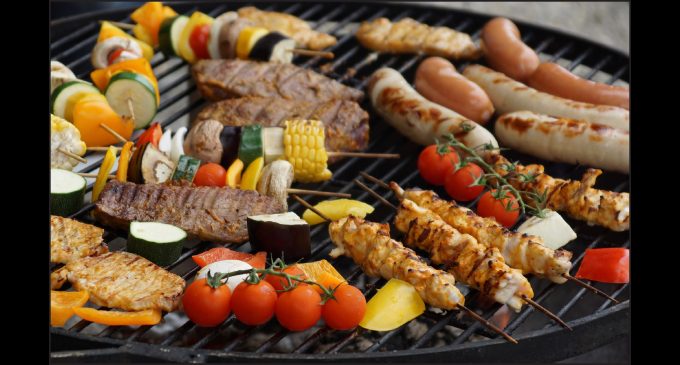Where there’s a grill, there’s a way
The wide range of foods suitable for grilling means that backyard cookouts can be part of a healthy diet.

Cookouts can be part of healthy eating
By Wayne Mogielnicki
You love backyard cookouts, but also want to maintain a healthy diet. No problem. Go ahead and fire up that grill!
Just be smart about what you cook and how you cook it, and be willing to broaden your view of what‘s grillable.
“When we think backyard barbecue it’s usually steaks, hamburgers, hot dogs, maybe with a bag of chips on the side,” said Annette Frain, a registered dietitian with Wake Forest Baptist Health. “But it can be much more than that. There are so many other things that taste great grilled, including vegetables.
“What you have to do is make sure the meal is balanced even though it’s a backyard barbecue.”
Grilled food definitely tastes different than food cooked indoors, and to most people’s thinking, it tastes better.
That’s because grilling, unlike other methods, cooks food three ways at once, explained Dr. Joey Skelton, a pediatrician at Wake Forest Baptist’s Brenner Children’s Hospital in Winston-Salem and an unabashed foodie.
“Grilling cooks by convection, which is heating the air all around what’s being cooked, as in an oven, and also by conduction, which is direct contact with a hot surface, in this case the metal grill but the same as a skillet on a stove top,” said Skelton, who conducts programs in culinary medicine, a new field that employs nutrition and good cooking habits to restore and maintain health. “Both of these will produce some browning on what you’re cooking, maybe some char, and some flavor.
“What grilling adds that your oven or stove top doesn’t is radiant heat. You won’t get that in an oven unless you’re using the broiler, but you will always get it on a grill because whether you have charcoal or gas lit you’re going to have rays of heat coming up to add another, different layer of browning, charring and flavor to whatever you’re cooking.”
There’s also a smoke factor to the flavor of grilled foods, he said, whether from some fat dripping from meat onto the coals or the use of woods chips.
But isn’t that dripping, smoking and charring unhealthy?
Yes, to a degree. Grilling meat over high heat produces two chemical compounds that have been linked to cancer in animal studies, and inhaling smoke is never good. But the risk level of getting cancer from weekend cookouts is quite low.
“If you’re eating well-done steak off a grill five times a week you might have a problem, but for the average person who’s grilling once a week or so it’s not a major concern,” Skelton said.
So what’s good to grill?
“Lean cuts of beef are great, but you can also choose chicken, pork tenderloin, lamb or fish, including shrimp and salmon. And you definitely shouldn’t forget the vegetables.”
The lineup of vegetables suitable for grilling isn’t short.
“People probably first think of the green bell pepper and onion that you put on kebabs, but there are so many others,” Frain said, citing eggplant, zucchini, corn, tomatoes, asparagus, mushrooms, carrots, green beans, broccoli and cauliflower. “They all have a different taste when they’re grilled.”
She suggests using a grill pan to prevent vegetables from falling through the grates.
Serving grilled fruit such as peaches or pineapple for dessert or offering fruit- or mint-infused water as a refreshing alternative to alcoholic and sugary drinks also can add to a cookout’s healthy quotient.
What you definitely do not want to do, she said, is leave cooked meat or side dishes like potato salad outside in hot weather for a long period of time.
“If you do you’ll be having a cookout that your guests won’t ever forget,” Frain said, “because they all walked away with food poisoning.
Wayne Mogielnicki is a writer for Healthwire, a publication of Wake Forest Baptist Medical Center.









